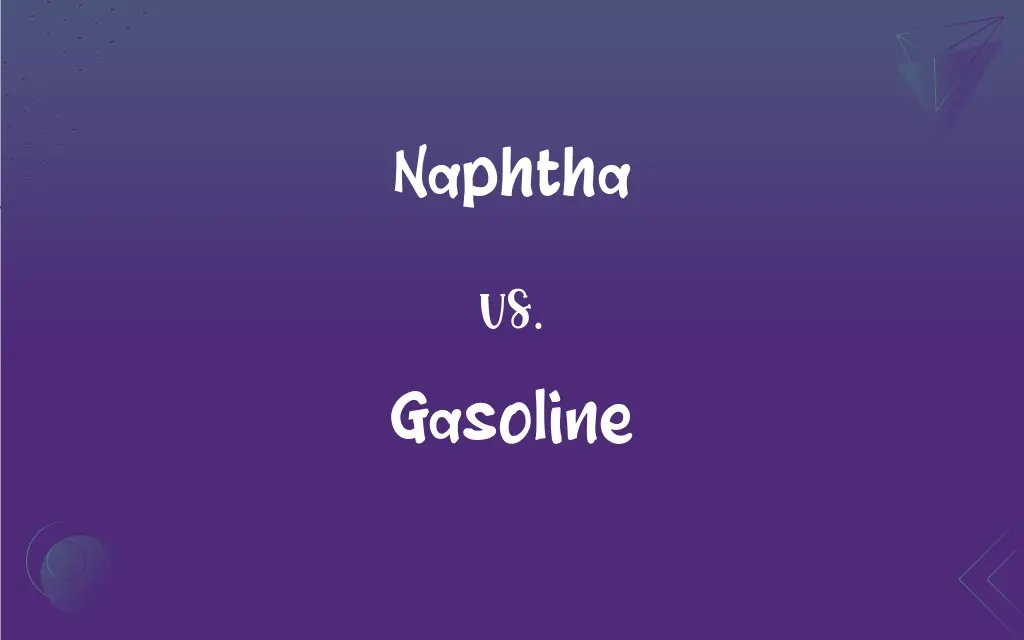Naphtha vs. Gasoline: What's the Difference?
By Janet White || Published on January 5, 2024
Naphtha is a volatile, flammable liquid hydrocarbon mixture used as a solvent and in producing chemicals, while gasoline is a refined petroleum product used primarily as fuel in internal combustion engines.

Key Differences
Naphtha is a general term for a range of volatile and flammable liquid hydrocarbon mixtures derived from petroleum. Gasoline, a specific type of naphtha, is refined further for use as a fuel in vehicles.
Naphtha is used in petrochemical industries as a feedstock for producing plastics, solvents, and synthetic fibers. Gasoline is primarily used as fuel in cars, motorcycles, and small engines.
The composition of naphtha can vary widely depending on its source and processing, making it versatile for industrial use. Gasoline is more standardized with specific additives for engine performance.
Naphtha serves as a starting material in the production of various chemicals. In contrast, gasoline is an end product, tailored for combustion efficiency and reduced emissions.
Naphtha often refers to lighter fractions from the distillation of crude oil, while gasoline is a specific blend of hydrocarbons with additives like ethanol for fuel use.
ADVERTISEMENT
Comparison Chart
Primary Use
Industrial solvent, chemical feedstock
Fuel for internal combustion engines
Composition
Varied hydrocarbon mix
Specific blend of hydrocarbons with additives
Application
Petrochemical industry, plastics production
Automotive and small engines
Production Process
Distilled from crude oil, less refined
Highly refined from crude oil
End Product Usage
Base for chemicals, solvents
Ready-to-use fuel
ADVERTISEMENT
Naphtha and Gasoline Definitions
Naphtha
A product of petroleum distillation.
The refinery produces naphtha as one of its primary outputs.
Gasoline
A fuel used in internal combustion engines.
Gasoline powers most of the cars on the road today.
Naphtha
A term for light distillates from crude oil.
The lighter fractions of crude oil are classified as naphtha.
Gasoline
A volatile and flammable liquid.
Due to its flammability, gasoline must be handled carefully.
Naphtha
A volatile liquid hydrocarbon mixture used in industry.
Naphtha is essential in the production of high-quality plastics.
Gasoline
Refined petroleum product with specific additives.
Modern gasoline includes additives to improve engine performance.
Naphtha
A feedstock for petrochemical processes.
Naphtha is crucial in synthesizing various synthetic fibers.
Gasoline
A blend of hydrocarbons from crude oil.
Gasoline is produced by refining different hydrocarbons from oil.
Naphtha
Used as a solvent in various applications.
Naphtha is often employed as a powerful cleaning solvent.
Gasoline
Used in cars, motorcycles, and small engines.
I filled my motorcycle with premium gasoline for better performance.
Naphtha
Any of several highly volatile, flammable liquid mixtures of hydrocarbons distilled from petroleum, coal tar, and natural gas and used as fuel, as solvents, and in making various chemicals. Also called benzine, ligroin, petroleum ether, white gasoline.
Gasoline
A volatile mixture of flammable liquid hydrocarbons derived chiefly from crude petroleum and used principally as a fuel for internal-combustion engines.
Naphtha
(Obsolete) Petroleum.
Gasoline
A flammable liquid consisting of a mixture of refined petroleum hydrocarbons, mainly used as a motor fuel; petrol.
Naphtha
(dated) Naturally occurring liquid petroleum.
Naphtha
Any of a wide variety of aliphatic or aromatic liquid hydrocarbon mixtures distilled from petroleum or coal tar, especially as used in solvents or petrol.
Naphtha
The complex mixture of volatile, liquid, inflammable hydrocarbons, occurring naturally, and usually called crude petroleum, mineral oil, or rock oil.
Naphtha
One of several volatile inflammable liquids obtained by the distillation of certain carbonaceous materials and resembling the naphtha from petroleum; as, Boghead naphtha, from Boghead coal (obtained at Boghead, Scotland); crude naphtha, or light oil, from coal tar; wood naphtha, from wood, etc.
Naphtha
Any of various volatile flammable liquid hydrocarbon mixtures; used chiefly as solvents
FAQs
How is naphtha produced?
Through the distillation of crude oil.
Is naphtha used as a fuel?
Not commonly; it's more for industrial purposes.
Are there different types of gasoline?
Yes, varying in octane ratings and additives.
Can naphtha be found in consumer products?
Yes, it's in some solvents and cleaners.
Is naphtha hazardous?
Yes, it's flammable and toxic if inhaled.
What is the primary use of gasoline?
As a fuel for internal combustion engines.
Is gasoline renewable?
No, it's a non-renewable fossil fuel.
Can naphtha be used in vehicles?
No, it's not suitable as a vehicle fuel.
What is naphtha primarily used for?
As a solvent and chemical feedstock in industry.
How is gasoline made?
By refining crude oil and adding specific additives.
What are the safety concerns with naphtha?
Flammability and potential health hazards from inhalation.
What additives are found in gasoline?
Commonly ethanol, detergents, and anti-knock agents.
Can gasoline be used as a solvent like naphtha?
Not recommended due to its specific formulation for engines.
Is naphtha environmentally friendly?
It can be harmful if not handled and disposed of properly.
Can gasoline be used in industrial processes like naphtha?
It's mainly for fuel, not as versatile as naphtha in industry.
How should gasoline be stored?
In approved containers, away from heat sources.
What is the shelf life of gasoline?
Typically around 3-6 months under proper storage.
Does naphtha have a role in producing gasoline?
It's a different product, but both come from petroleum refining.
Are there environmental concerns with gasoline usage?
Yes, it contributes to pollution and greenhouse gas emissions.
Can the composition of naphtha vary?
Yes, depending on the source and refining process.
About Author
Written by
Janet WhiteJanet White has been an esteemed writer and blogger for Difference Wiki. Holding a Master's degree in Science and Medical Journalism from the prestigious Boston University, she has consistently demonstrated her expertise and passion for her field. When she's not immersed in her work, Janet relishes her time exercising, delving into a good book, and cherishing moments with friends and family.
































































